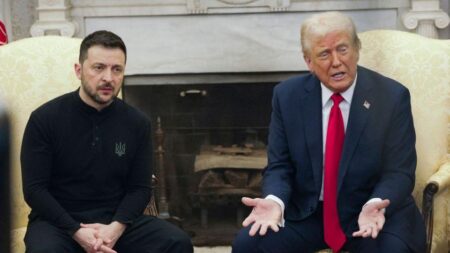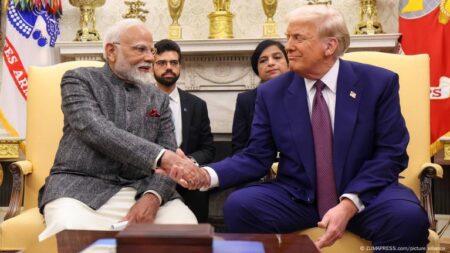as the conflict between Ukraine and Russia enters a new phase, geopolitical tensions continue to escalate, with significant implications for international diplomacy. Recent developments have seen Russian President Vladimir Putin suggesting a temporary management in Ukraine to facilitate peace negotiations, a proposal that has been firmly rejected by the United States. This stance underscores the ongoing complexities surrounding Ukraine’s sovereignty and the international community’s commitment to supporting its democratically elected government led by President Volodymyr Zelensky. In this article, we will examine the latest updates on the war, the circumstances surrounding Putin’s call, and the implications of the U.S. response for future diplomatic efforts aimed at resolving the conflict.
US stance on Ukrainian Leadership Signals Continued Support for Zelensky
In a decisive move reflecting its unwavering commitment to Ukraine’s sovereignty and democratic choices, the United States has unequivocally rejected Russian President Vladimir Putin’s suggestion to replace President Volodymyr Zelensky with a temporary administration. American officials have expressed that any shift in Ukrainian leadership would undermine the country’s right to self-determination, emphasizing the crucial role Zelensky has played in unifying Ukraine amidst ongoing conflict. This stance reinforces the notion that the U.S. aims to support not just the defense of Ukrainian territory,but the legitimacy of its elected leaders in the face of external aggression.
The rejection of Putin’s proposal highlights a broader strategy by washington to bolster Ukraine’s resilience and ensure its continued governance under Zelensky.Analysts suggest this decision is pivotal for several reasons:
- Symbol of Democracy: Supporting Zelensky reinforces democratic values in a region threatened by authoritarianism.
- Stability in leadership: A consistent leadership under Zelensky is vital for maintaining domestic and international alliances.
- Negotiations Moving Forward: The U.S. positions itself as a partner in seeking a viable peace solution, insisting that any negotiations must involve the current Ukrainian leadership.
This steadfast support from the U.S. sends a clear signal not only to Ukraine, but also to russia and its allies, that undermining ukraine’s elected government will not be tolerated. As the region braces for potential escalations in the conflict, the emphasis remains on diplomatic channels that respect Ukraine’s autonomy and advocate for a resolution led by its existing leadership.
Analysis of Putin’s Proposals in Context of Ongoing Peace Efforts
In the wake of the recent discussions surrounding Vladimir Putin’s proposals for resolving the ongoing conflict in Ukraine, various factors come into play that are essential to a thorough understanding of the situation. Central to these proposals is the notion of a transitional administration to replace Volodymyr Zelensky, which has been flatly rejected by the United States. This rejection underscores a deep-seated commitment from Western nations to support Ukraine’s sovereignty and territorial integrity. Analysts argue that this proposal could be perceived as an attempt by Russia to gain leverage amid ongoing peace efforts, as it effectively places the control of negotiations in a contentious and unrecognized framework.
The implications of adopting such a transition, even temporarily, could alter the peace landscape dramatically. Key considerations include:
- Legitimacy of Leadership: Any proposed administration would face significant scrutiny regarding its legitimacy, both domestically and internationally.
- International Response: The US and EU have indicated that they would not endorse any government not freely elected,potentially isolating Russia further.
- Impact on Civil Society: The restructuring of governance could lead to a fracturing of civil responses and protests within Ukraine.
these elements are juxtaposed against the backdrop of existing peace initiatives that prioritize diplomatic avenues rather than forced political changes. A comprehensive analysis of Putin’s proposals reveals a multi-layered tactic that seeks to obscure Russia’s aggressions while crafting a narrative of peace. The complexity of establishing a fruitful dialogue is further highlighted by the ongoing military confrontations, which create an surroundings where trust remains elusive.
Implications for International Relations Following US Rejection of Russian Demands
The recent decision by the United States to reject President Vladimir Putin’s demands for the ousting of Ukrainian President Volodymyr Zelensky raises significant questions about the future dynamics of international relations.This stance signals a definitive commitment by the U.S. to support Ukraine’s sovereignty and democratic governance, fundamentally altering the power calculus within Eastern Europe. As a result, several implications may unfold:
- Strengthening Alliances: The U.S. rejection reinforces NATO’s unity and may encourage other member states to bolster their military support for Ukraine, which could lead to an escalation of Western involvement in the conflict.
- Signs of Escalation: Russia may respond with increased military pressure on Ukraine or foster conflict in other regions, testing the limits of international tolerance and forcing a reevaluation of global military postures.
- diplomatic Tensions: This situation could strain U.S.-Russia relations further, with the potential for retaliatory measures or sanctions that may impact various sectors, including energy and trade.
Moreover, the implications extend beyond the immediate conflict as they may influence global security frameworks. Countries watching this conflict closely will likely assess their own strategic positions and alliances, mindful of potential repercussions. The recent rejection by the U.S. highlights a stark ideological divide, leading to:
- Realignment of Global Partnerships: Nations may seek to redefine relationships based on how they align with U.S.or Russian interests, reshaping geopolitical alliances and economic partnerships.
- Emergence of New Conflict Zones: Countries with similar authoritarian tendencies might perceive this dynamic as an opportunity to expand their influence, possibly igniting tensions in their respective regions.
- Increased Humanitarian Concerns: Heightened military involvement and prolonged conflict could exacerbate humanitarian crises, compelling the international community to grapple with the need for coordinated aid efforts.
Recommendations for Diplomatic Channels to Facilitate Peace Negotiations
In the ongoing context of the Ukraine-Russia war, fostering effective diplomatic channels becomes imperative for advancing peace negotiations. Stakeholders should prioritize creating a comprehensive framework that emphasizes inclusive dialogue among all parties involved. Critical steps could include:
- multilateral Talks: Engaging not just Ukraine and Russia but also influential global players, such as the United States, European Union, and relevant regional organizations, ensures a broader consensus and reinforces the legitimacy of the negotiations.
- Backchannel Communications: Utilizing discreet channels for dialogue can facilitate trust-building measures between the conflicting parties, paving the way for a more formal negotiation structure.
- Role of Neutral Mediators: Appointing unbiased third-party mediators could help bridge gaps in understanding and offer creative solutions that may not be apparent to the parties involved.
Furthermore, establishing a dedicated peace summit with clear objectives can substantially enhance the momentum for dialogue. This summit could focus on disarmament agreements and humanitarian access.A structured approach might consist of:
| Objective | Expected Outcome |
|---|---|
| Ceasefire Agreements | Reduction in hostilities and civilian casualties |
| Humanitarian Corridors | Improved access for aid to affected populations |
| Post-Conflict Reconstruction Plans | Framework for rebuilding and stabilizing the region |
To Wrap It Up
the ongoing conflict between Ukraine and Russia remains complex and multifaceted, with significant developments shaping the landscape of international diplomacy. The U.S. government’s firm rejection of President Putin’s proposal to remove Ukrainian President Volodymyr Zelensky in favor of a temporary administration underscores the West’s continued support for Ukraine’s sovereignty and democratic processes. As the war approaches its second year, the call for negotiations persists, but it is clear that any peace talks must prioritize the legitimate aspirations of the Ukrainian people. The situation remains fluid, and the international community watches closely, hoping for a resolution while preparing for the potential ramifications of a protracted conflict. As both sides navigate this challenging terrain, the focus on diplomatic solutions will be critical to achieving lasting peace in the region.




